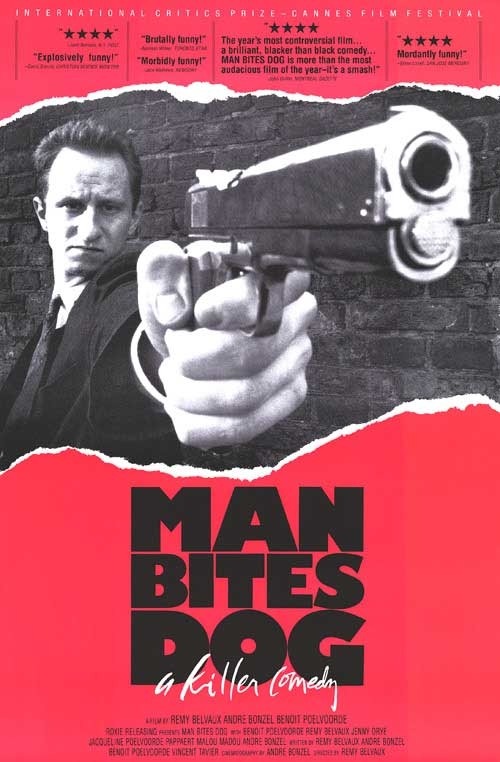#JeanMarcChenut
Text
Thoughts : Man Bites Dog (1992)

As long as there has been film, there have been filmmakers that eschew traditional format, choosing to blur the lines of genre and style to great effect. One of the most unique forms of genre-bending cinema is the mockumentary, where the content is presented as fact, despite the generally outrageous nature of what we are presented. In 1992, a group of French filmmakers blew the minds of those in attendance at the Cannes Film Festival with a film as hilarious as it was controversial : Man Bites Dog.
Filmmakers Andre (Andre Bonzei) and Remy (Remy Belvaux), in their search for a documentary subject, discover Ben (Benoit Poelvoorde), a sociopath with a penchant for murder. The crew follows Ben around as he kills indiscriminately, all the while professing his philosophy, protocol and procedure on how he hunts and dispatches his victims. As the crew continues to document over time, Ben becomes less and less discreet with his killings, and all the while, Andre, Remy and the crew find themselves transitioning from witnesses to participants. At first, the crew helps with dispatching bodies, but over time, they eventually find themselves taking part in the crimes. Ben’s practices, however, come back to haunt him, turning him from killer to a public enemy, and putting himself and the crew in the line of fire.
This film is a bold, brash and at times downright depressing sign of the times. In a world that was just discovering the tenants of reality television, unknowing that the format would eventually come to dominate entertainment, Man Bites Dog was well ahead of the curve in terms of not sugarcoating the presentation of its subject (albeit this presentation was an extreme one). The public has come to thrive off of the conflict (and possibilities of subjects presenting the worst of themselves) that seems to fuel modern day entertainment, very similar to the way that Andre and Remy find themselves captivated by Ben to the point that they become active participants in the madness. Ultimately, Ben becomes the director of his own show, and the presence of the film crew becomes a form of instant validation for his actions, as he justifies his actions under the guise of entertainment.
Where the film really works, as previously mentioned, is the slow and subtle way that the crew morphs into killers at the hands of Ben and his actions. The transition from shocked witnesses to willing participants happens when one of the crew is killed by an eventual victim of Ben’s, but once they get the taste for blood, their descent into depravity is is as shocking as it is quick. At a point where the normal person would distance themselves from the walking, talking danger that is Ben, his magnetic personality manages to embolden them, lifting them out of their sorrow and ‘helping’ them feel larger than life, all the while never shedding their true role as documentarians as they capture the entire series of events.
The purposely amateur, realistic presentation works extremely well, instantly engaging us as viewers into a world that mirrors our own in all aspects except for Ben’s actions. The handheld nature of the majority of the film mirrors that of Cops, helping to push that immersive nature to its limits. The crew attempts the traditional manner of capture at first, trying to stay out of the way and impartial to the subject, but many aspects of the production become key to the film itself : Ben constantly complains about the lights blowing his cover, many moments occur where the sound separates from the subject, and at one point the zoom lens is used to aid Ben in his capture of a victim. The black and white choice removes glamour from the film, instead making it as gritty and dangerous as the world presented to us.
Andre Bonzel and Remy Belvaux do a good job of portraying innocent witnesses that find themselves eventually corrupted by the mix of charm and terror they are presented with, and their cult member-esque devotion to Ben is captured pitch perfectly. Benoit Poelvoorde, hands down, is the heart and soul of the film, and the majority factor in whether or not the film works. His joy presented in the presence of others is infectious, and the way that he carries himself and uses his personality to capture a room is hard to deny. This is paralleled, however, with a truly callous, heartless and selfish manner that he switches to with little to no warning, embodying many of the factors that define the most sociopathic killers and criminals in history. Not only is he bloodthirsty, but his general lack of caring for humanity is peppered with touches of racism, misogyny and pedophilia, usually presented as offhand comments.
While serial killers are nothing new to the world of cinema, Man Bites Dog managed to serve as a both a transitional style bridge, and a warning of what was to come in the world of entertainment if left unchecked and unregulated. Human nature has always been to push the limits, and the commentary provided on what could possibly occur if the limits of entertainment were pushed is stark, shocking and wholly impactful.
#ChiefDoomsday#DOOMonFILM#RemyBelvaux#AndreBonzel#BenoitPoelvoorde#ManBitesDog#ValerieParent#JeanMarcChenut#AlainOppezzi#VincentTavier
1 note
·
View note